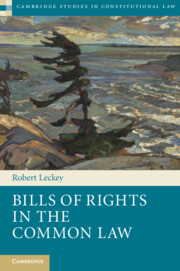Book contents
- Frontmatter
- Dedication
- Contents
- Acknowledgements
- Table of cases
- Introduction
- 1 Against bill-of-rights exceptionalism
- 2 The common law, judging, and three bills of rights
- 3 Judicial review of legislation before bills of rights
- 4 Bills of rights and other means of accessing judgment
- 5 Putting the strike-down in its place
- 6 Remedies from text to practice
- 7 Improving the system and engaging the legislature
- 8 Rethinking remedies and constitutional supremacy
- Conclusion
- Bibliography
- Index
5 - Putting the strike-down in its place
Published online by Cambridge University Press: 05 May 2015
- Frontmatter
- Dedication
- Contents
- Acknowledgements
- Table of cases
- Introduction
- 1 Against bill-of-rights exceptionalism
- 2 The common law, judging, and three bills of rights
- 3 Judicial review of legislation before bills of rights
- 4 Bills of rights and other means of accessing judgment
- 5 Putting the strike-down in its place
- 6 Remedies from text to practice
- 7 Improving the system and engaging the legislature
- 8 Rethinking remedies and constitutional supremacy
- Conclusion
- Bibliography
- Index
Summary
Turning from the conditions for accessing the courts, this chapter investigates what judges do when they resolve rights cases. As emerges from this chapter and the next, the text of a rights instrument does not fully foretell the kinds of orders that judges will make when applying it or the factors to which they will refer. The record of judicial review of legislation on bases other than rights, in Chapter 3, does not provide a reliable map either. Close study of practice reveals that, in judges' hands, bills of rights take on a certain life of their own.
The survey in this chapter establishes that, rather than confronting a binary choice between upholding legislation and striking it down, judges face an array of questions: Should they resolve a rights issue by interpreting a law compatibly with the bill of rights? Should they declare legislation incompatible with rights or invalid? Can they remedy the constitutional defect by reading down, reading-in, or severance? Should they make their order immediate or suspend it? Is the law invalid since it first collided with protected rights or only going forward? Quantitative study of wins and losses in rights cases will not capture these significant determinations. In some cases, the changes in judicial activity discussed here flow from the bill of rights. In others, they represent judicial agency.
The first four parts of this chapter offer a portrait, derived from analysing the case law, of how the apex courts of the UK, Canada, and South Africa resolve challenges to legislation under the bills of rights. They address, respectively, judges' activity in interpreting legislation to make it compatible with rights, in declaring legislation incompatible with rights, in delaying an order's effect, and in issuing a prospective order. Reaching beyond judicial actions customarily classified as remedies, the fifth part introduces the giving of advice to legislative drafters as another exercise of judicial power in rights cases, providing examples from the three courts. Together, these five parts pursue the dual ambition of depicting judicial practices in rights cases and of identifying relative degrees of judicial agency.
- Type
- Chapter
- Information
- Bills of Rights in the Common Law , pp. 93 - 122Publisher: Cambridge University PressPrint publication year: 2015



